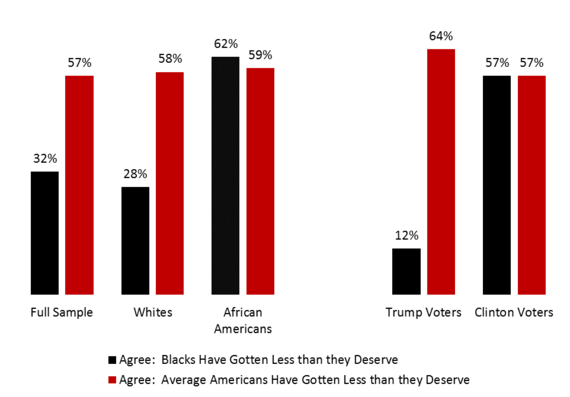
Many have argued that Donald Trump won the presidency because the political establishment ignored the plight of white working class Americans. Everyone from the far right to far left, including Donald Trump, Bernie Sanders, and Joe Biden has suggested that the Clinton campaign didn't pay enough attention to this group's legitimate economic grievances.
A few astute analysts, however, have noted that the sympathetic focus on white America's problems stands in stark contrast with conservatives' lack of empathy for communities of color. Indeed, when African Americans protest against profound racial inequality--unequal conditions that are directly traceable to discriminatory governmental policies--they are often condemned by the right as "whiners" who should simply try harder to remedy their own situations.
Such different portraits of white and non-white Americans' grievances have their origins in what social psychologists call "ultimate attribution error." This error means that when whites struggle, their troubles are generally attributed to situational forces (e.g., outsourcing); but when non-whites struggle, their plight is more often attributed to dispositional traits (i.e., poor work ethic). Consequently, whites are considered "more deserving" than blacks.
To quantify this double standard in deservingness we embedded an experiment in a new HuffPost/YouGov survey. We asked half of our respondents if they agreed or disagreed with the following statement: "Over the past few years, blacks have gotten less than they deserve." The other half of the sample was provided with the exact same statement, except we changed "blacks" to "average Americans"--a group that psychology research shows is implicitly synonymous with being white.
The results show a very strong public divide in the perceived deservingness of average Americans and African Americans:

A clear majority (57 percent) in the survey said that average Americans aren't getting their fair share in society. But only 32 percent agreed when that same statement applied to African Americans.
The display further shows that this disparity in the perceived deservingness of average Americans and African Americans was even more pronounced among whites. Whites were thirty percentage points more likely to say that average Americans aren't getting what they deserve, compared to African American Americans (58 percent to 28 percent respectively).
The biggest double standard in deservingness, though, occurred for Trump voters. Almost two-thirds of Trump voters said that average Americans aren't getting as much as they deserve; only 12 percent of Trump supporters said blacks have gotten less than they deserve.
Meanwhile, there was a much smaller gap in the two groups' perceived deservingness among African Americans and Clinton voters. African Americans and Clinton voters were equally likely to say that both average Americans and blacks have gotten less than they deserve over the past few years.
Perhaps most importantly, the display shows that the main dividing line between Clinton and Trump voters was on the question black deservingness. Most voters, regardless of who they supported in the presidential election, thought that average Americans are getting less than they should. Yet, Clinton's voters were a great deal more likely than Trump's to say that blacks have also gotten less than they deserve (57 percent to 12 percent respectively).
It appears, then, that Trump voters weren't simply motivated by their widespread belief that average Americans are being left behind. Rather, their strong suspicion that African Americans are getting too much--a belief held by the overwhelming majority of Trump voters--was a much stronger predictor of their vote choices in last month's election.
Racially resentful beliefs that African Americans are getting more than they deserve were so strongly linked to support for Trump, in fact, that their impact on both the 2016 Republican Primary and the general election were larger than they had ever been in before.
--
Use the widget below to further explore the results of HuffPost/YouGov's survey. You can select survey questions using the menu at the top, and filter data by subgroups using the buttons at the bottom:
The HuffPost/YouGov poll consisted of 1,000 completed interviews conducted Dec. 6-7 among U.S. adults, using a sample selected from YouGov's opt-in online panel to match the demographics and other characteristics of the adult U.S. population.
